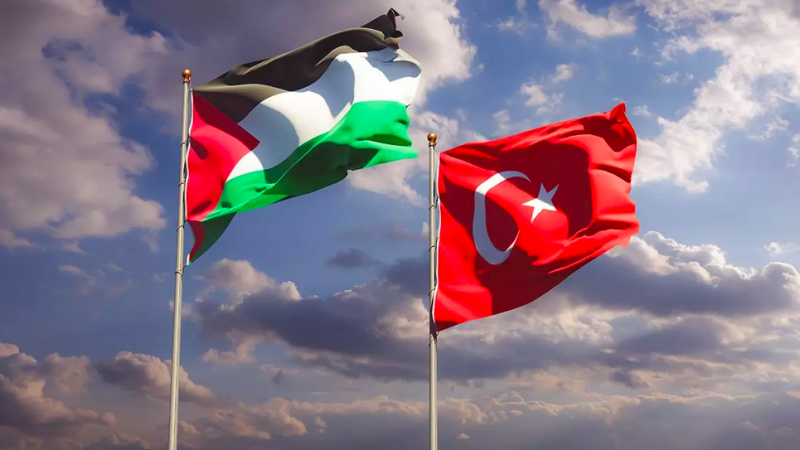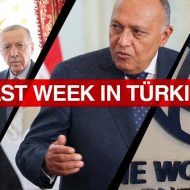November 15 marks the foundation day of two different states in the Middle East: The Turkish Republic of Northern Cyprus (TRNC), in 1983, and the State of Palestine in 1988. Their historic leaders, Rauf Denktaş and Yasser Arafat once met and expressed envy to each other’s standing: Denktaş told Arafat he was envying Palestine, because it was recognized as a state by dozens of others, while the TRNC was recognized only by Türkiye. Arafat responded: I would give up all the diplomatic recognitions if only a state like Türkiye Palestine’s guarantor state was.
The status of guarantor or protective power is today on the agenda, as the Turkish government has proposed to be one for Palestine and the Gaza Strip. The anecdote above was provided us Professor Hüseyin Işıksal. Professor Işıksal is the Special Advisor to the Turkish Republic of Northern Cyprus (TRNC) President on International Relations and Diplomacy, Member of the Negotiation Team and the Chairperson of the International Relations Committee.
Işıksal, who provided us with details of the Turkish proposal, has recently also moderated workshops taking place in the Center for Strategic Research connected to the Turkish Foreign Ministry.
What is the background of the Turkish proposal to become a protective power for Palestine?
First of all, we have to state some facts to lay the theoretical ground of the proposal. Serious humanitarian crimes are being committed in Gaza, and the world watches them as if they were a reality show. What is happening there is a humanitarian tragedy.
A look at the region shows us endless conflict between the Arabs and Israel, including four big wars, those of 1948, 1956, 1967 and 1973. In addition to them are the conflicts around Southern Lebanon and the Gaza Strip from the 1980s to the 2000s.
We see that if the Palestinians are forced out of their territory, they are never able to return. 75 years of history produced around 6 million Palestinian refugees in the Middle east – the 1.5 million in Gaza not included. We are speaking of the people in the world with the greatest refugee population.
And finally, Western public opinion pretends there is no Palestinian state, or tries to downgrade it by calling it ‘Authority’. Truth is there is an observer state in the United Nations that is member to UNESCO, FIFA and even the International Court of Human Rights. In other words, it has all the right to conclude an agreement of guarantorship with another state if it decides to.
What is the core idea of the proposal?
The Turkish model states three main points: Firstly, Palestine and Israel need to have different protective powers. Naturally, Palestine needs guarantors from the region. The United States may be the protective power of Israel.
Secondly, the protective powers need to succeed to evolve the process towards the two-state-solution. The main goal is not their eternal presence here but to stop first the humanitarian tragedy and then open the path to a lasting solution.
By the way, Türkiye does not insist to be the lone protective power. Other countries may assume this role as well. But this is not an easy task: you need to have a strong, respected and deterring military – one that is capable to keep the opposing side from taking wrong steps. This task also has a serious financial dimension. And it needs strong domestic public opinion support, because you may suffer losses.
And finally, you need to have open channels for mediation. Now, if you look at the Arab states, several of them treat Hamas still as a terror organization. Türkiye on the other side is the first Muslim country that recognized Israel diplomatically and maintains open channels of communication with both sides.
Given all these factors, Türkiye has serious advantages. Any other Arab country that fulfills these criteria may assume the role as well.
How can Israel and its Western supporters be convinced to accept this model?
This question has no outright answer. My personal opinion is that the current Israeli regime is not one close to this model.
On the other side, we know that there is a serious, farsighted part in the Israeli population that wants a sustainable peace. At this point, the Israeli population, media and intellectuals need to discuss the following question: Does Israel benefit from an independent Palestinian state or not?
My argument to them: Though Israel has already normal diplomatic relations with some neighboring countries and is trying to normalize with more, what is happening in Gaza harms Israel’s reputation and bilateral economic relations seriously.
Hence, I think that the farsighted sectors of the Israeli society acknowledge that without sustainable peace, they will always be in danger of facing attacks like on October 7. Therefore, these sectors and the United States need to pressure on Israel a little bit more.
President Erdoğan is travelling to Germany on November 17. Afterwards, he will meet the Presidents of Algeria and Iran. Do you think that this model will be an issue in the talks?
I think it will definitely be on the agenda. As you see, Türkiye has been one of the most active countries in the conflict around Palestine. And Ankara is ready to contribute actively.
It may not be guarantorship at the very beginning. The process may start with an international conference where possible protective powers discuss how to achieve a truce first.
Cyprus also has a history connected to protective powers. How do you evaluate the experiences on the island?
Of course, the Republic of Cyprus of 1960 doesn’t exist anymore, though the southern part of the island claims to represent it. In the core of the issue is the following truth:
If today the Turkish people of Cyprus is able to live in peace, this is 100% due to the guarantorship model and the position of Türkiye as a protective power. Türkiye’s right to intervene within that model has saved our people from a massacre and a genocide.
I do not want to say that the Cypriot model of 1960 shall be applied to Palestine. What I am trying to say is that without military security, you don’t have nothing, no society, culture, economy today.
Can you compare the positions of the South Cypriots Greek Administration and the Turkish Republic of Northern Cyprus in regard to the Palestine issue?
The conflict has once again shown how strategic the island of Cyprus is. It is an unsinkable aircraft carrier. The United Kingdom for instance has closed down all its military bases around the world, but has maintained the status of sovereignty of those in Cyprus.
Cyprus is located on all major trade routes, it controls the Suez Canal, it overlooks the Middle East and Israel. All military interventions into crises in the Middle East occur from British bases in the south. Sometimes the Americans come, then follows the French military, occasionally it is NATO forces. South Cyprus is used frequently as a base of transport, transfer and maybe even attack by United States, United Kingdom and other European forces, while the Turkish Republic of Northern Cyprus supports the peace and stands shoulder to shoulder with the Palestinian state.
But I do have to mention a sad moment. The Turkish people has always stood by the Palesinian people. But we have seen statements against the TRNC especially from the wing of Palestinian President Mahmoud Abbas. We have seen them continuously arm in arm with Southern Cyprus. This is very surprising and saddening, as Southern Cyprus today has every kind of bilateral agreement with Israel in terms of military, economic relations till energy. This position of the Palestinian government truly saddens us.
In spite of that and the fact that we are under international embargo and blockade, the government of the Turkish Republic of Norther Cyprus is ready to provide all kind of assistance and support to Palestine.









Leave a Reply